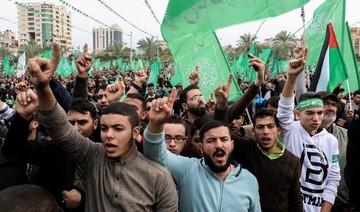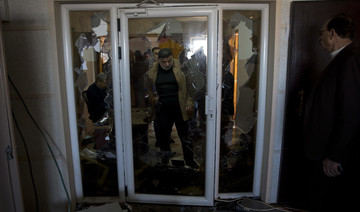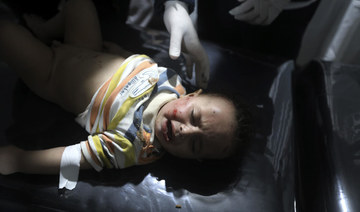RAMALLAH, Palestinian Territories: The decade-long Palestinian split looks set to deepen in the coming months, with president Mahmoud Abbas poised to take multiple measures against Gaza to squeeze its Islamist rulers Hamas.
The moves raise concerns of more suffering for Gaza’s two million residents, already under an Israeli blockade and facing severe electricity shortages, while a cornered Hamas could renew violence against Israel.
Analysts say the measures will also widen the gap between Hamas-run Gaza and the occupied West Bank, where Abbas’s government has limited self-rule.
Hamas and Abbas’s secular Fatah party have been at loggerheads since the Islamists seized control of Gaza from Abbas’s forces in a near civil war in 2007, a year after sweeping parliamentary elections.
Hamas has since fought three bloody wars with Israel and fears of a fourth remain.
Multiple reconciliation attempts between the Palestinian factions have failed but Egypt thought it had made a breakthrough in late 2017 when the two sides agreed to eventually share power.
As part of that agreement Hamas withdrew from border crossings between Gaza and Egypt and Israel, allowing the Fatah-dominated Palestinian Authority to return and the Egyptian border to be reopened regularly.
The reconciliation agreement has since collapsed acrimoniously.
On Sunday, the PA announced it would withdraw from the Egyptian border crossing, creating a dilemma for Cairo about whether to leave it open with Hamas in control.
So far they have indicated they will.
Senior officials close to Abbas say he is looking for other measures to punish Hamas.
Among these could be removing staff from the crossings between Israel and Gaza — making it hard for the Jewish state to allow anything into the territory without dealing directly with Hamas, which it and many other countries label a terrorist organization.
They could also include cutting salaries to families of Hamas prisoners or rescinding Palestinian passports for Hamas employees.
Abbas has also pledged to dissolve the Hamas-dominated Palestinian parliament, which though it hasn’t met since the 2007 split is still nominally the basis for new laws.
“Very important decisions against Hamas are being discussed,” a senior official said on condition of anonymity.
It follows a series of arrests of those affiliated with Fatah in Gaza, according to Abbas allies.
The official said the PA spent around $100 million per month in Gaza, including for electricity subsidies, and was looking to cut back significantly.
“Those that want to rule Gaza must bear the responsibility of governing it,” the official said.
Azzam Al-Ahmad, a senior Abbas ally and negotiator of the 2017 reconciliation agreement, told AFP “the leadership is considering a number of measures.”
Senior Hamas official Bassem Naim said the Islamists had seen similar threats before.
“Any type of sanctions such as electricity, preventing medicine, closing the border or cutting the salaries are intended to blackmail residents into rising against Hamas and they fail,” he told AFP.
“This is the most that Abbas can do.”
The Palestinians have faced stark challenges over the past two years, with US President Donald Trump leading what he has called the most pro-Israel administration in the country’s history.
Israeli Prime Minister Benjamin Netanyahu’s right-wing government has meanwhile continued to expand settlements in the West Bank.
Abbas’s government froze contacts with the Trump administration after it recognized the disputed city of Jerusalem as Israel’s capital in December 2017.
The deepening split between the two factions weakens their ability to respond to such pressure, said Hugh Lovatt of the European Council on Foreign Relations think-tank.
He said the PA withdrawal from the border crossings was part of a “package of measures designed to try and squeeze Hamas.”
“It is not irreversible but it is certainly a very negative step. This is short-term thinking triumphing longer-term strategy.”
Nadia Hijab, president of the Al-Shabaka Palestinian think-tank, said the infighting prevented a united front against Israeli policies.
“Palestinians fear that this latest move will cement the division and lead to a complete break between Gaza and the West Bank, something Israel has been pushing,” she said.
Both sides were “playing politics with people’s lives instead of taking on Israel’s 50-year-plus occupation,” she said.
At least 241 Palestinians have been killed by Israeli fire in Gaza since mass protests along the border began in March 2018. Two Israeli soldiers have been killed.
The protests had calmed in recent months after Hamas and Israel struck an agreement that saw Qatari aid allowed into the territory.
This week, it was reported that Israel had blocked a third tranche of Qatari funding, which could lead to increased tensions.
“If the Israelis do block the money, then I think it is almost a certainty you will see Hamas increasing the tension on the border,” Lovatt said.
Palestinian president plans anti-Hamas measures as split widens
Palestinian president plans anti-Hamas measures as split widens
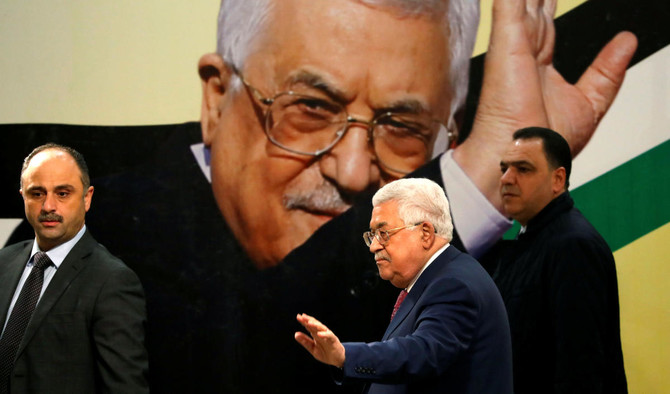
- Hamas and Abbas’s secular Fatah party have been at loggerheads since the Islamists seized control of Gaza from Abbas’s forces in a near civil war in 2007
- As part of that agreement Hamas withdrew from border crossings between Gaza and Egypt and Israel, allowing the Fatah-dominated Palestinian Authority to return
UK announces sanctions targeting Iranian defense sector
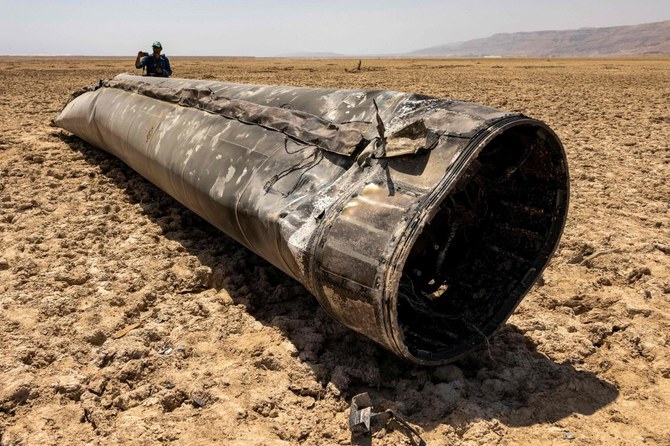
LONDON: Britain on Thursday announced new sanctions targeting Iranian individuals and businesses in the country’s defense sector for involvement in what it said was “hostile activity” by the Iranian government.
Britain had added six designations under its Iranian sanctions regime, an official notice showed.
Egypt, Dutch leaders discuss Gaza ceasefire efforts

- Rafah assault ‘will have catastrophic consequences on regional peace and security,’ El-Sisi warns
- Egypt’s president and the Dutch prime minister agreed on the urgency of working toward reaching a ceasefire
CAIRO: Egypt’s President Abdel Fattah El-Sisi has discussed efforts to reach a ceasefire in Gaza with Mark Rutte, prime minister of the Netherlands.
During a phone call from Rutte on Thursday, the Egyptian leader warned that any Israeli assault on Rafah will have “catastrophic consequences” for the humanitarian situation in the enclave.
The leaders discussed bilateral relations, and ways to enhance cooperation across various political and economic levels consistent with the current momentum in Egyptian-European relations.
Ahmed Fahmy, presidential spokesman, said the call also focused on the situation in Gaza, and Egypt’s efforts to restore regional stability by reaching a ceasefire and providing access to humanitarian aid.
El-Sisi reiterated the crucial importance of ending the war, warning against any military operations in the Palestinian city of Rafah, which will have catastrophic consequences on the humanitarian situation in the strip and on regional peace and security.
The Egyptian leader underscored the need for the international community to assume its responsibilities to implement the relevant UN resolutions.
Egypt’s president and the Dutch prime minister agreed on the urgency of working toward reaching a ceasefire, and ensuring the flow of adequate humanitarian aid to all areas of the Gaza Strip in order to protect it from a humanitarian catastrophe.
They also emphasized the need to move toward implementing the two-state solution, which would restore regional stability, and establish security and peace in the region.
In March, El-Sisi received Rutte to discuss bilateral relations, regional developments, and Egypt’s efforts to reach a ceasefire and offer humanitarian assistance in Gaza.
Lebanon postpones local elections again as violence rocks south

- Lebanon is supposed to hold municipal elections every six years
- Parliament approved “extending the existing municipal and elective councils’ mandate until a date no later than May 31, 2025,” despite objections from lawmakers opposed to Hezbollah
BEIRUT: Lebanon’s parliament on Thursday delayed municipal elections for a third time in two years, state media reported, as militants in the country’s south exchanged near-daily fire with Israel for over six months.
The powerful Iran-backed Hezbollah group has been trading fire with Israeli forces across the border since the day after its Palestinian ally Hamas carried out a deadly attack on Israel on October 7, triggering the ongoing war in the Gaza Strip.
Lebanon is supposed to hold municipal elections every six years, but cash-strapped authorities last held a local ballot in 2016.
Parliament approved “extending the existing municipal and elective councils’ mandate until a date no later than May 31, 2025,” despite objections from lawmakers opposed to Hezbollah, said the official National News Agency.
The bill cited “complex security, military and political circumstances following the Israeli aggression on Lebanon” and especially its south, near the border, as reasons for the delay.
Lawmakers did not set a new date for the elections, initially scheduled for 2022.
Local councils help provide basic services to residents, but their role has declined as state coffers ran dry after Lebanon’s economy collapsed in late 2019.
Parliament Speaker Nabih Berri had previously said southern Lebanon could not be excluded from any upcoming ballot, after the Christian Lebanese Forces, the main party opposing Hezbollah, insisted on holding the polls on time.
More than 92,000 people have been displaced from their homes in Lebanon due to the violence, as have tens of thousands of residents of Israeli communities across the border.
Since violence began along the Israeli border on October 8, at least 380 people have been killed in Lebanon, including 72 civilians, according to an AFP tally.
Israel says 11 soldiers and eight civilians have been killed on its side of the border.
In April 2023, the Lebanese parliament had already postponed municipal elections as the deputy speaker warned holding them was “almost impossible” for the cash-strapped country after years of economic meltdown.
Lebanon has faced the prolonged financial crisis and months of border clashes essentially leaderless, without a president and headed by a caretaker government with limited powers amid deadlock between entrenched political barons.
Palestinian officials say Israeli forces kill teen in West Bank
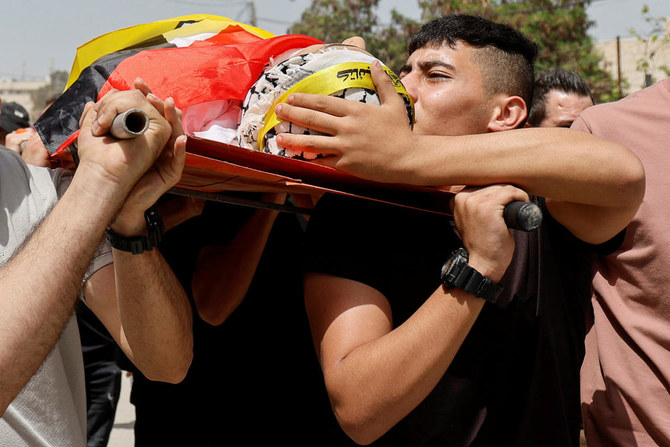
- Israeli police said “hits were identified” when forces responded to stone-throwing with gunfire
- The Palestinian health ministry said Khaled Raed Arouq was shot in the chest and “martyred by the occupation’s live bullets“
RAMALLAH, Palestinian Territories: Palestinian officials said Israeli forces killed a 16-year-old boy during a raid in the West Bank city of Ramallah early on Thursday.
Israeli police said “hits were identified” when forces responded to stone-throwing with gunfire but did not directly address the allegation.
The Palestinian health ministry said Khaled Raed Arouq was shot in the chest and “martyred by the occupation’s live bullets.”
Palestinian official news agency Wafa said Arouq died after being “shot by Israeli gunfire” early on Thursday morning.
Israeli forces carry out regular raids on towns and cities in the occupied West Bank and violence has soared in the Palestinian territory since the war in Gaza broke out on October 7.
Wafa said Israeli military vehicles stormed the city and “confrontations broke out between citizens and the occupation forces, who fired live bullets and stun grenades.”
It said Israeli forces were stationed in several neighborhoods and raided a house in Al-Bireh to the northeast.
Israeli police said: “Terrorists threw stones at the forces operating in the area, the forces responded with gunfire, and hits were identified.”
The police said they made several arrests and that Israeli forces did not suffer any casualties.
The army did not immediately respond to AFP’s request for comment.
Later on, Thursday, mourners carried Arouq’s body wrapped in the flag of Fatah, the political party of Palestinian president Mahmud Abbas, in his hometown of Jenin where he was buried.
“He was hit by a bullet in his back, which exited through his chest...They assassinated him in cold blood,” Majed Arqawi, cousin of Arouq, told AFP.
Wafa said Arouq’s father was an officer in the Palestinian military intelligence service.
Israel has occupied the West Bank since 1967 and at least 488 Palestinians have been killed by Israeli troops or settlers there since October 7, according to Palestinian officials.
At least 19 Israelis have been killed in attacks by Palestinians in the same period, according to official Israeli figures.
Hezbollah denies Israel claim it killed half of commanders in south
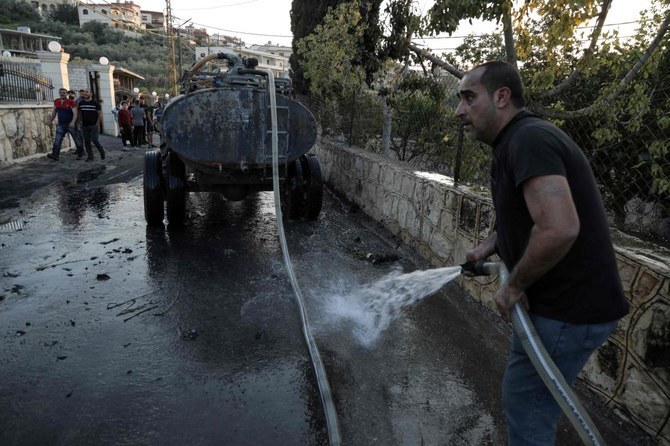
- The number of slain Hezbollah members who “hold a certain level of responsibility does not exceed the number of fingers on one hand“
- Gallant’s claim was “untrue and baseless”
BEIRUT: Hezbollah denied on Thursday an Israeli claim that it had killed half of the Iran-backed Lebanese group’s commanders in the south of the country, saying only a handful were slain.
The Lebanese group has been exchanging near-daily fire with the Israeli army since the day after its Palestinian ally Hamas carried out an unprecedented attack on Israel on October 7.
Israel’s Defense Minister Yoav Gallant said on Wednesday that “half of Hezbollah’s commanders in southern Lebanon have been eliminated” in the months of cross-border violence sparked by the Israel-Hamas war in Gaza.
“The other half are in hiding and abandoning the field to IDF (Israeli army) operations,” he added, without specifying how many.
A Hezbollah source who spoke on condition of anonymity rejected the claim.
The source told AFP that the number of slain Hezbollah members who “hold a certain level of responsibility does not exceed the number of fingers on one hand.”
The source said Gallant’s claim was “untrue and baseless” and designed to “raise the morale of the collapsed (Israeli) army.”
Israel has frequently claimed to have killed local Hezbollah commanders in targeted strikes, but the group has only confirmed a few were high-level members, referring to the rest as fighters in their statements.
Since October 8, the day after the Hamas attack on southern Israel, at least 380 people have been killed in Lebanon, including 252 Hezbollah fighters and dozens of civilians, according to an AFP tally.
Israel says 11 soldiers and eight civilians have been killed on its side of the border.
Tens of thousands of people have been displaced on both sides.
Both sides have stepped up attacks this week, with Hezbollah increasing rocket fire on military bases, while Gallant said in his latest remarks the army had carried out “offensive action” across southern Lebanon.
The Israeli military also said on Wednesday that it had struck 40 Hezbollah targets in Lebanon’s south.
Hezbollah leader Hassan Nasrallah has said his group had some 100,000 “trained” and “armed” fighters, but analysts say this number is likely inflated.


